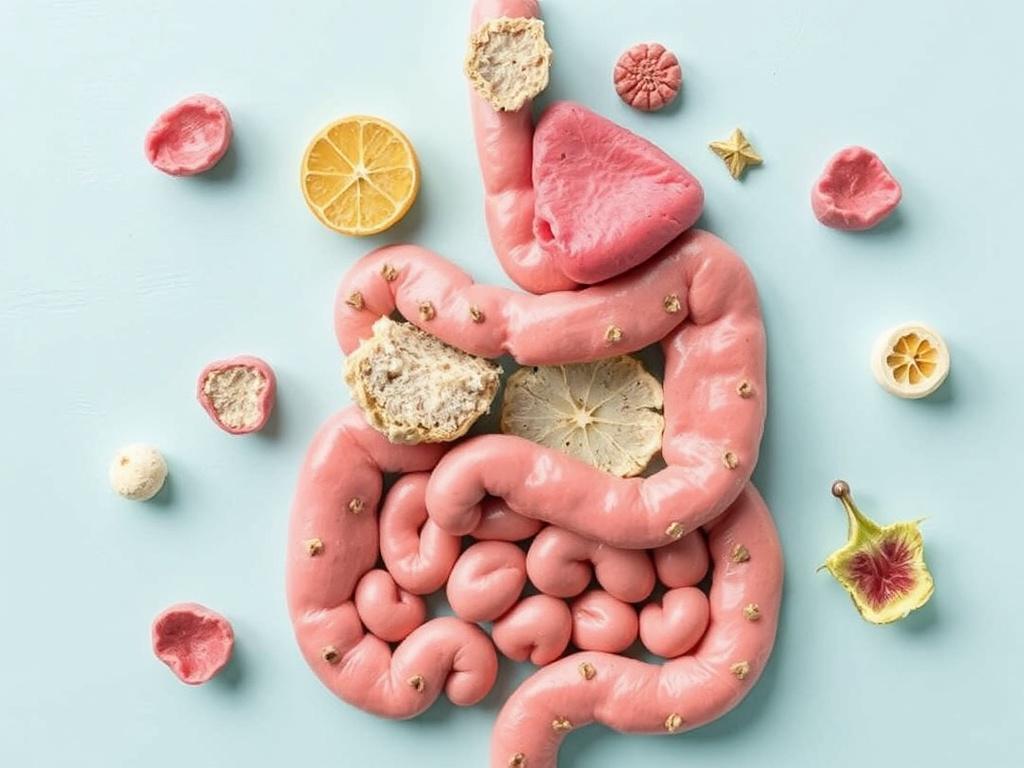Содержание статьи
- 1 Understanding the Gut-Skin Axis: What Does Science Say?
- 2 The Role of Nutrition in Gut and Skin Health
- 3 How Probiotics and Prebiotics Influence Clear Skin
- 4 Other Lifestyle Factors Impacting Gut and Skin Health
- 5 Common Skin Conditions Linked to Gut Health
- 6 Practical Tips to Improve Gut Health for Clear Skin
Have you ever wondered why, despite trying countless skincare products, your skin still struggles with breakouts, redness, or dullness? It turns out the answer may lie far beneath the surface—in your gut. The connection between gut health and clear skin is a fascinating area of study that has captured the attention of dermatologists, nutritionists, and wellness enthusiasts alike. Our gut and skin are intimately linked, communicating through what scientists call the “gut-skin axis.” Understanding this connection can open doors to natural and lasting improvements in your skin, often by simply focusing on nourishing your digestive system.
The gut is sometimes referred to as our “second brain” because of the tremendous influence it has not only on digestion but also on many other bodily functions, including immune regulation and inflammation. Since many skin conditions are related to inflammation, it’s no surprise that what happens inside our digestive tract often reflects outwardly on our skin. This article will explore the gut-skin connection in depth, discuss how gut health directly impacts skin clarity, and provide practical tips on nurturing your gut for beautiful, radiant skin.
Understanding the Gut-Skin Axis: What Does Science Say?

To truly grasp the connection between gut health and clear skin, we first need to understand what the gut-skin axis means. The gut-skin axis refers to the biochemical and physiological communication pathways that link the gut microbiome—the community of trillions of bacteria and other microbes living in your digestive tract—with skin health.
Our gut hosts both beneficial and harmful bacteria. A balanced gut microbiome supports digestion, nutrient absorption, and immune function. When this balance is disrupted, often due to poor diet, stress, medications, or lifestyle factors, it can lead to systemic inflammation and immune system dysfunction. This imbalance, called dysbiosis, not only triggers digestive issues like bloating or indigestion but also contributes to inflammatory skin conditions such as acne, eczema, and rosacea.
Recent scientific studies have shown that the gut and skin share immune cells and inflammatory signals that travel through the bloodstream. When the gut barrier becomes “leaky” (a condition known as increased intestinal permeability), inflammatory molecules can escape into the bloodstream and reach the skin, exacerbating skin problems.
Key Factors Affecting the Gut-Skin Connection
Here is a table summarizing some of the main factors that influence the gut-skin connection:
| Factor | Impact on Gut | Resulting Skin Effect |
|---|---|---|
| Poor Diet (refined sugars, processed foods) | Feeds harmful bacteria, reduces beneficial microbes | Inflammation, acne breakouts |
| Stress | Alters gut motility and microbiome composition | Flare-ups of eczema, rosacea |
| Antibiotics and Medications | Disrupt gut flora, cause dysbiosis | Dryness, redness, skin sensitivity |
| Probiotics and Prebiotics | Support growth of beneficial bacteria | Improved skin clarity, reduced inflammation |
| Hydration | Maintains gut lining integrity | Better skin hydration and glow |
By paying attention to these factors, we can influence our gut microbiome and consequently foster clear, healthy skin.
The Role of Nutrition in Gut and Skin Health

Nutrition plays a pivotal role in shaping our gut microbiome. What we eat provides the building blocks not only for nourishing our body but also for supporting the diverse bacterial ecosystem living inside us. Unfortunately, many modern diets high in processed foods, sugar, and unhealthy fats can wreak havoc on gut health, starving beneficial bacteria and allowing harmful strains to flourish.
Foods That Support a Healthy Gut and Clear Skin
Incorporating gut-friendly foods into your diet is one of the simplest and most effective ways to promote clear skin naturally. Here’s a list of some of the best foods to include:
- Fermented Foods: Yogurt, kefir, sauerkraut, kimchi, and miso contain live probiotics that can help rebalance the gut microbiome.
- Prebiotic Fiber: Foods like garlic, onions, leeks, asparagus, bananas, and oats feed the good bacteria, helping them thrive.
- Omega-3 Fatty Acids: Found in fatty fish such as salmon, chia seeds, and flaxseeds, omega-3s help reduce inflammation that can aggravate the skin.
- Antioxidant-Rich Fruits and Vegetables: Berries, leafy greens, carrots, and bell peppers protect the skin from oxidative stress and support detoxification.
- Hydration: Drinking plenty of water is essential for flushing toxins from the gut and maintaining skin moisture.
On the other hand, limiting foods that promote gut dysbiosis can greatly benefit your skin:
- Refined sugars and sweets that feed harmful microbes
- Highly processed and fried foods
- Excessive dairy, which can be inflammatory for some people
- Alcohol, particularly in large quantities
Daily Sample Meal Plan for Gut and Skin Health
| Meal | Sample Foods |
|---|---|
| Breakfast | Greek yogurt with mixed berries, chia seeds, and a drizzle of honey |
| Snack | Apple slices with almond butter |
| Lunch | Quinoa salad with mixed greens, roasted vegetables, avocado, and a lemon-tahini dressing |
| Snack | Carrot sticks and hummus |
| Dinner | Grilled salmon, steamed asparagus, and a side of fermented sauerkraut |
| Hydration | Water with lemon throughout the day |
This type of balanced, nutrient-dense eating plan encourages a flourishing gut microbiome and provides antioxidants to support skin repair and renewal.
How Probiotics and Prebiotics Influence Clear Skin
Probiotics—live beneficial bacteria—and prebiotics—the dietary fibers that feed these bacteria—are essential players in the gut-skin axis. By helping to restore balance to your gut microbiome, they can reduce systemic inflammation and support skin health improvements.
Probiotic Strains Beneficial for Skin
Research has identified several probiotic strains that show promise in improving skin conditions:
- Lactobacillus acidophilus: Helps strengthen gut barrier function and reduce inflammation.
- Bifidobacterium breve: Associated with alleviating acne and skin sensitivity.
- Lactobacillus rhamnosus: Shown to reduce eczema severity and improve barrier function.
Probiotic supplements or naturally fermented foods can help replenish and diversify your microbiome, complementing topical skincare routines.
Prebiotics and Their Importance
Prebiotics include soluble fibers that humans cannot digest but serve as food for probiotics. When these fibers are fermented by gut bacteria, they produce short-chain fatty acids (SCFAs) like butyrate, which have anti-inflammatory and immune-modulating effects. This reduces skin redness, swelling, and acne flare-ups.
Including prebiotic-rich foods, like chicory root, Jerusalem artichokes, garlic, and onions, regularly can keep your gut bacteria thriving and support clear, smooth skin.
Other Lifestyle Factors Impacting Gut and Skin Health
Beyond diet, several lifestyle habits influence the gut-skin connection strongly.
Stress Management
Chronic stress triggers hormonal imbalances and impacts the gut microbiome negatively. Elevated cortisol levels can increase gut permeability, allowing toxins and inflammatory agents to pass into the bloodstream and worsen skin conditions. Practices such as meditation, yoga, regular exercise, and adequate sleep can help keep stress in check and protect your gut-skin axis.
Sleep and the Repair Cycle
Your body undergoes critical repair and regeneration during sleep, including gut mucosa healing and skin cell renewal. Poor sleep patterns disrupt gut bacteria diversity and increase systemic inflammation, making it harder to achieve clear skin. Aim for at least seven to eight hours of quality sleep to give your gut and skin the best chance to heal and glow.
Avoiding Harmful Substances
Smoking and excessive alcohol consumption damage the gut lining and disrupt skin barrier function. Smoking reduces blood flow to the skin, deprives it of oxygen and nutrients, and harms good bacteria. Similarly, alcohol causes dehydration and gut inflammation—all factors that can dull your complexion and exacerbate skin problems.
Common Skin Conditions Linked to Gut Health
Understanding how gut imbalances contribute to specific skin conditions can clarify why improving gut health is crucial for skin clarity.
Acne
Acne affects millions worldwide and has been linked to gut dysbiosis. When harmful bacteria proliferate, it can promote systemic inflammation and hormonal imbalances that fuel acne. Studies show that supplementing with probiotics can significantly reduce acne lesions by modulating immune responses and reducing inflammation.
Eczema (Atopic Dermatitis)
Eczema is characterized by red, itchy, and inflamed skin. Emerging research suggests that people with eczema often have reduced gut microbial diversity, which impairs the immune system’s ability to tolerate harmless substances, increasing skin sensitivity.
Rosacea
Rosacea is a chronic inflammatory condition causing redness and swelling, often linked to intestinal disorders such as small intestinal bacterial overgrowth (SIBO). Treating underlying gut problems has shown improvement in rosacea symptoms in many cases, underscoring the gut-skin connection.
Psoriasis
Psoriasis involves overactive skin immune responses leading to thick, scaly patches. A disrupted gut microbiome and increased intestinal permeability can exacerbate systemic inflammation seen in psoriasis, making gut health optimization a promising adjunct therapy.
Practical Tips to Improve Gut Health for Clear Skin

If you want to start embracing the gut-skin connection and achieve clear skin naturally, here are some actionable steps:
- Eat a diverse, fiber-rich diet: Include plenty of fruits, vegetables, whole grains, and fermented foods.
- Consider probiotics: Either through supplements or probiotic-rich foods, try to add beneficial bacteria daily.
- Drink plenty of water: Hydration maintains gut lining integrity and helps detoxify the body.
- Manage stress: Practice mindfulness, exercise, or hobbies you enjoy to lower stress levels.
- Get quality sleep: Prioritize 7-8 hours of restful sleep each night.
- Limit sugar and processed foods: These feed harmful gut bacteria and increase inflammation.
- Avoid unnecessary antibiotics: Use medications only as prescribed to protect your microbiome.
When to Talk to a Professional
If you struggle with persistent skin issues despite a healthy lifestyle, consulting a dermatologist or gastroenterologist can help identify underlying gut health problems or food sensitivities. Sometimes, advanced testing and personalized treatment are necessary to restore balance to your gut and skin.
Conclusion
The connection between gut health and clear skin is more than just a trendy concept—it’s a scientifically backed reality that highlights the importance of nurturing our digestive system for radiant skin. By understanding the intricate gut-skin axis, adopting a gut-friendly diet rich in probiotics and prebiotics, managing stress, maintaining hydration, and leading a balanced lifestyle, you can transform your skin from the inside out. Clear skin is not just about topical treatments; it begins deep within your gut, where harmony among trillions of microbes sets the stage for glowing, healthy skin. Embrace the power of your gut, and watch your skin reflect the vibrant health within.

